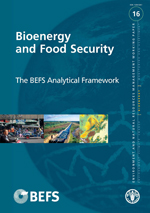FAO has released a new report that contains methodology designed to aid policymakers assess the pros and cons of investing in the bioenergy industry. The “Bioenergy and Food Security (BEFS) Analytical Framework” was written to help governments evaluate the potential of bioenergy as well as assess its possible food security impacts. The framework was developed over a three-year time frame and cites development and field tests that took place in Peru, Tanzania and Thailand.
The report is comprised of a series of step-by-step evaluations that seek to answer critical questions regarding the feasibility of bioenergy development and the impacts on food availability and household food security. In addition, social and environmental dimensions are also considered. The paper also serves as a platform for bringing key ministries and institutions together so they can work on the same page.
 “Our goal is to help policy-makers take informed decisions regarding whether bioenergy development is a viable option and, if so, identify policies that will maximize benefits and minimize risks,” explains Heiner Thofern, who heads FAO’s Bioenergy and Food Security (BEFS) project.
“Our goal is to help policy-makers take informed decisions regarding whether bioenergy development is a viable option and, if so, identify policies that will maximize benefits and minimize risks,” explains Heiner Thofern, who heads FAO’s Bioenergy and Food Security (BEFS) project.
The drive to biofuels have been driven by both worries over greenhouse gas emissions from fossil fuels as well as high oil prices and energy security concerns. FAO believes that one important benefit of investments into the bioenergy sector is that it could spark much-needed investment in agricultural and transport infrastructure in rural areas. This would create jobs and boost household income. These benefits could lesson both poverty and food security concerns. FAO has also conducted separate studies that show small-scale bioenergy projects not designed for export markets can improve food security and help boost rural economies.
“FAO has been saying for years that under-investment in agriculture is a problem that seriously handicaps food production in the developing world, and that this, coupled with rural poverty, is a key driver of world hunger,” says Thofern. “Done properly and when appropriate, bioenergy development offers a chance to drive investment and jobs into areas that are literally starving for them.”
Yet while there are major potential benefits to bioenergy production, FAO warns there are also potential negatives. They write that large-scale biofuel production could come at the expense of food production, leading to less food available, and higher food prices. In addition, deforestation is also a concern. Therefore, potential risks and benefits need to be weighed.

